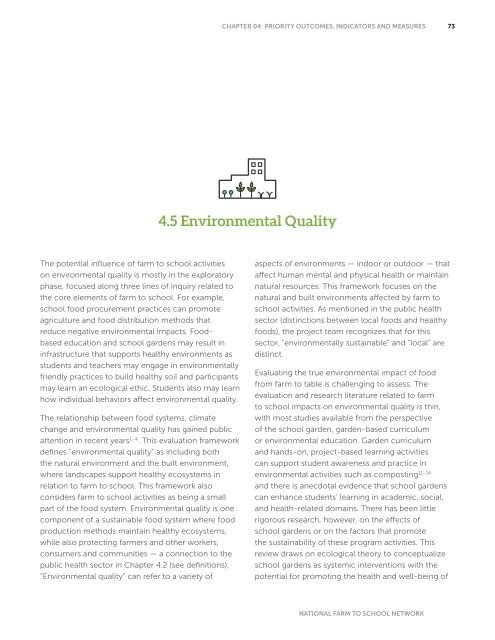Framework-08-25-14_web
Framework-08-25-14_web
Framework-08-25-14_web
Create successful ePaper yourself
Turn your PDF publications into a flip-book with our unique Google optimized e-Paper software.
CHAPTER 04: PRIORITY OUTCOMES, INDICATORS AND MEASURES734.5 Environmental QualityThe potential influence of farm to school activitieson environmental quality is mostly in the exploratoryphase, focused along three lines of inquiry related tothe core elements of farm to school. For example,school food procurement practices can promoteagriculture and food distribution methods thatreduce negative environmental impacts. Foodbasededucation and school gardens may result ininfrastructure that supports healthy environments asstudents and teachers may engage in environmentallyfriendly practices to build healthy soil and participantsmay learn an ecological ethic. Students also may learnhow individual behaviors affect environmental quality.The relationship between food systems, climatechange and environmental quality has gained publicattention in recent years 1–4 . This evaluation frameworkdefines “environmental quality” as including boththe natural environment and the built environment,where landscapes support healthy ecosystems inrelation to farm to school. This framework alsoconsiders farm to school activities as being a smallpart of the food system. Environmental quality is onecomponent of a sustainable food system where foodproduction methods maintain healthy ecosystems,while also protecting farmers and other workers,consumers and communities — a connection to thepublic health sector in Chapter 4.2 (see definitions).“Environmental quality” can refer to a variety ofaspects of environments — indoor or outdoor — thataffect human mental and physical health or maintainnatural resources. This framework focuses on thenatural and built environments affected by farm toschool activities. As mentioned in the public healthsector (distinctions between local foods and healthyfoods), the project team recognizes that for thissector, “environmentally sustainable” and “local” aredistinct.Evaluating the true environmental impact of foodfrom farm to table is challenging to assess. Theevaluation and research literature related to farmto school impacts on environmental quality is thin,with most studies available from the perspectiveof the school garden, garden-based curriculumor environmental education. Garden curriculumand hands-on, project-based learning activitiescan support student awareness and practice inenvironmental activities such as composting 11–<strong>14</strong>and there is anecdotal evidence that school gardenscan enhance students’ learning in academic, social,and health-related domains. There has been littlerigorous research, however, on the effects ofschool gardens or on the factors that promotethe sustainability of these program activities. Thisreview draws on ecological theory to conceptualizeschool gardens as systemic interventions with thepotential for promoting the health and well-being ofNATIONAL FARM TO SCHOOL NETWORK


